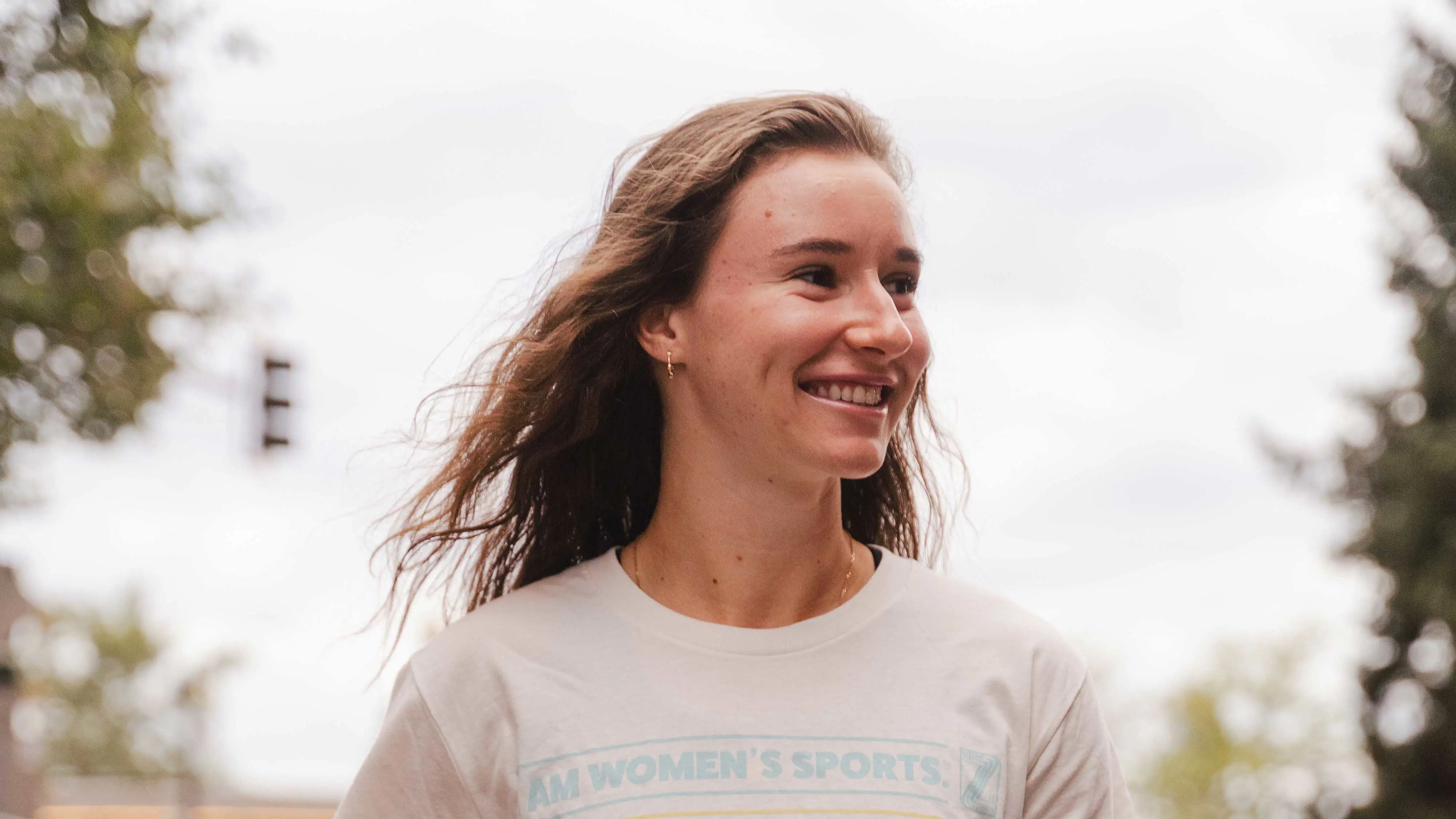Player Op-Ed
Emina Ekic: "More Muslim players should reach out to their clubs before and during Ramadan"
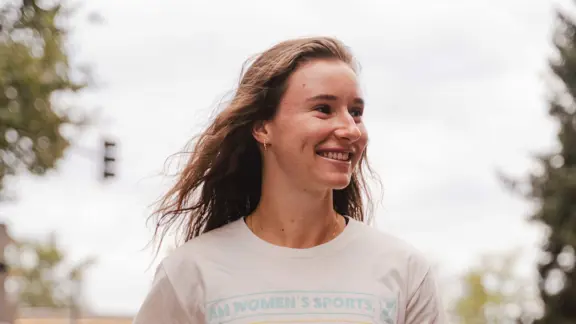
About the author
Bosnian-American footballer Emina Ekic is a midfielder for USL Super League side Spokane Zephyr and the Bosnia and Herzegovina women's national team. The 25-year-old talks about challenging stereotypes and perceptions of Muslims, and the importance of players having conversations with clubs when observing Ramadan.
By Emina Ekic
I may not look like what people perceive to be an average Muslim. When I go out, there's nothing that visibly shows my religion and I only wear a hijab when I go to the mosque or a religious event. Many Muslims in Bosnia do the same.
I had always practiced my religion at home with my family, yet I never talked openly about it until I was in college. Mainly it just never came up in conversation, as most people where I grew up in Louisville, Kentucky weren’t Muslim.
One day at college, I was invited to go to Fellowship Christian Athletes. It was the first time I was open about my religion because I replied: “Actually, I’m not Christian – I’m Muslim”. While I never purposedly hid my religion from others, that moment felt like a huge relief. For the first time, I was able to say: “This is who I am”.
I had been scared of how people could react because I know, unfortunately, when some people hear ‘Muslim’ they can think of negative stereotypes. My team-mates, though, were just cool about it. At first, they thought I was joking – after all, there was nothing about me that visibly portrayed that I was Muslim. But afterwards, they wanted to know more and asked me so many questions.
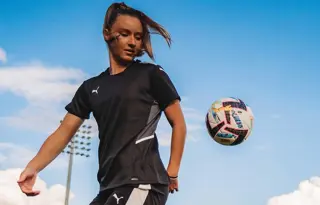
I was brought up to respect all religions and to recognise they all share similar values. My parents came to America in the 90s to escape war in the Balkans and they got a lot of help from the church when they arrived in Louisville. They had no family, nothing to go back to, could not speak a lot of English at the time, and so the church was their support network to help them get on their feet. It’s why my parents have always instilled the values of charity and being kind to others in my brother and I.
My parents were taken to a community centre in Louisville, which at the time had quite a lot of Arab refugees, and that’s where I first fell in love with soccer. My dad would play with people from the Iraqi community; I loved watching him and, as a kid, I just wanted to play as well. My parents were open to the idea of me playing soccer; they weren’t against it, but they were certainly more hesitant with me than my brother. When I was 10, they signed me up to my first organised team, and everything went from there.
It was around that time that I also first observed Ramadan. It’s a spiritual time that brings you closer to God. For 30 days, you eat before sunrise, fast during the day and then break your fast at sunset.
Naturally, it can be difficult observing Ramadan as an athlete. When I played in Australia, for instance, it was hot during the day, you can’t have a sip of water and you need to be hydrated and fuelled when performing at a high level. But one thing I want to stress about Ramadan: no-one is making me do this. I don’t want sympathy. I’m doing it because I want to do it. It’s a time of mindfulness, which brings me closer to my faith.
Until recently, I had never reached out to any coach during the season to tell them I was observing Ramadan. I didn’t want to feel like a burden. I didn’t want to come across like I was nagging anybody. Ramadan was also something I did with my family, so it felt like an in-house thing, away from soccer.
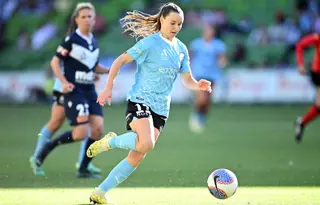
When I was in Australia with Melbourne City last season, though, the head coach, physio, and nutritionist, scheduled a meeting with me. It was out of the blue, so at first I thought I was in trouble! But they kicked off that meeting saying they knew Ramadan was coming up and they wanted to make a tailored plan to help with my nutrition, hydration, and recovery for that month. Every detail was covered: ‘It’s going to be especially hot this period, you won’t do gym on these days, you won’t do top-ups those days’.
It took me by surprise. I didn't expect to have that conversation with them, but it was something I really appreciated. They even gave me techniques that I had never thought about during Ramadan before, especially when it came to protein in-take. It was the first time a club had really catered to my needs like that during Ramadan. There was also a prayer room, which was such a positive surprise for me.
After that, it made me think: why haven’t I ever just told anyone before? It is difficult in the sense that you want to perform at your best and, at this level, you don't want to lose your spot. You also don’t want to feel like a nuisance. But Melbourne City reaching out like that really put me at ease. It made that conversation much more comfortable to have. And, ultimately, they wanted to get the best out of me during that time – both as a player and person.
My team-mates could not have been more supportive. Taylor Otto, who I played against in college before we were both drafted to Racing Louisville and then roomed with in Melbourne, observed a day of Ramadan with me on a rest day, to see what it was like.
We made overnight oats and had a lot of carbs – fruit, peanut butter, honey – before sunrise, stuff that will burn slowly throughout the day. We walked around, watched TV, read books, and later we went shopping to make dinner for when we broke our fast after sunset. A lot of my team-mates were very considerate during that time. Even outside of Ramadan, they know I don’t eat pork, so when we would get burritos after practice, they would warn me which ones had bacon – they were so cute.
I would encourage more Muslim players to reach out to their club before and during Ramadan. I wish I did earlier; I just never realised that was a possibility until that year in Australia. Even if you don’t need help, it's good for people to know you are fasting. Clubs should also make an effort to create a safe space and ask those questions.
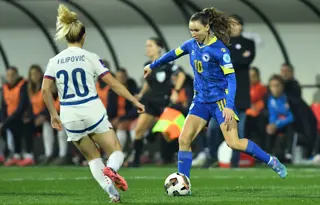
No matter what their religion, people turn to their faith for support. I always pray before I step on the field before training, before games. It helps me feel protected. I joke with my friends: ‘Oh, I have to be on my best behaviour because it's Ramadan’. But as a player and as a person, it’s a time that helps me take a step back and have more patience. Of course, you get tired. But because you're also not acting right away on emotions, that mindfulness can also boost your game.
I was first called up to the Bosnian national team in July 2023. Even though I grew up speaking Bosnian as my first language at home, it took a couple of years to get the paperwork for my passport as I was born in America.
I have a lot of pride representing Bosnia. I also know how things are in the US and I want to help the Bosnian national team be more competitive on and off the pitch – whether that’s introducing a collective bargaining agreement (CBA) or helping find other players who are of Bosnian heritage – so that we can compete on the international level that bit more.
Cover image credit: Spokane Zephyr FC
